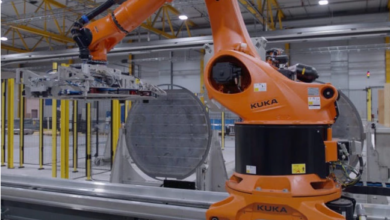ArcelorMittal, VEO and McPhy to build pilot electrolysis plant

The global steel and mining group ArcelorMittal is moving forward on the path to climate-neutral steel production at its Eisenhüttenstadt site.
Together with energy supplier Vulkan Energiewirtschaft Oderbrücke (VEO) – a joint venture between the city of Eisenhüttenstadt and ArcelorMittal – and McPhy Energy, specialized in low-carbon hydrogen production and distribution equipment (electrolyzers and refueling stations), ArcelorMittal Eisenhüttenstadt will build a pilot electrolysis plant and a hydrogen filling station on the plant site.
The innovative demonstration project includes the supply of two McLyzer electrolysers with an output of 1 MW each. In addition, a long-term 5-year service contract was agreed upon. The state of Brandenburg is funding the project with 5.1 million euros as part of the regional innovation cluster.
The electrolysers will produce hydrogen for direct use in steel production. The hydrogen will first be used in the cold rolling mill. The hydrogen filling station is used to refuel forklifts or trucks with some of the hydrogen produced. The oxygen also generated during electrolysis is to be reused on-site in production, for example in the hot rolling mill.
Another goal is to optimize the overall energy efficiency of the production site by testing newly developed smart operating modes in real-world applications.
The Brandenburgish Technical University (BTU) Cottbus-Senftenberg is providing scientific support for the project and analyzing data from hydrogen used at the demonstration plant to improve efficiency and support further development of electrolysers.
Reiner Blaschek said, “The demonstration plant will serve H2 use in steel production as well as the logistical use of hydrogen-powered vehicles around steel production. With this project, we want to examine and show how to further emission reductions are possible now before a complete change in technology and the use of further hydrogen in the coming years will fully convert production to climate neutrality.”
Prof. Dr. Jörg Steinbach said, “The use of hydrogen in steel production contributes significantly to the urgently needed hydrogen infrastructure as a necessary building block for maintaining the steel industry in Brandenburg and for the energy transition. The project couples the energy, industry and mobility sectors and helps to reduce CO2 emissions in steel production and in the state of Brandenburg in the long term.”
Jean-Baptiste Lucas commented, “We are proud to participate in this large-scale and innovative project alongside ArcelorMittal and the State of Brandenburg. This is our first major contract in the industrial sector, one of the most strategic and promising applications for green hydrogen. The work will be carried out in Germany, close to our site in Wildau. This is a milestone in our European expansion strategy and proof of the importance of our pan-European industrial set-up.”
Prof. Dr. Lars Röntzsch said, “Increasing energy efficiency through the use of intelligent operating modes in electrolysis is a challenging topic that we are very happy to work on scientifically in order to make our contribution to ensuring that this important future technology enables climate-neutral operation in such an energy-intensive industry as the steel industry. Hydrogen will be of great importance as a green energy carrier for industry and mobility in Brandenburg.”
